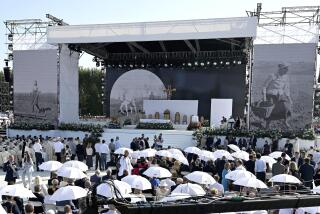In Defense of a Nation Falsely Singled Out : Lithuania: A small minority persecuted and killed Jews; many other Lithuanians were heroic in trying to save them.
- Share via
Each nation under Nazi occupation, perhaps with the exception of the Danes, produced a sufficient, and in most cases a superfluous, number of collaborators and “Jew-killers.”
At the same time, in each Nazi-occupied nation there were hundreds of heroic and righteous individuals who risked their lives and the lives of their families in order to save Jews and to help them to survive the Holocaust. Everywhere, active Nazi collaborators were a small minority, as were the active resisters and saviors of the Jews.
The majority of each nation was busy trying to survive in the adverse conditions of Nazi rule and was neither collaborating with nor fighting the Nazis. To talk about an entire people as having collaborated with the Nazis is extremely offensive and morally unacceptable. Lately, Lithuanians have been singled out for censure as having collaborated with the Nazis. In this regard, Lithuanians were neither better or worse than any other nation.
Yes, it is true that at the outbreak of war in June, 1941, some Lithuanian anti-Semites, joined by criminal and perverted elements (of which there are plenty in every nation), took advantage of the collapse of authority in Lithuania to kill and rob Jews. To justify such savagery, those who participated falsely and indiscriminately accused Jews of having been Soviet collaborators in Lithuania’s occupation and forced merger with the Soviet Union the year before.
But it is also true that many Lithuanians, among them the parents of Lithuania’s president today, Vytautas Landsbergis, nobly and self-sacrificially tried to save their Jewish compatriots from extinction during the Nazi occupation.
Having escaped from the Nazi death camp near Kaunas, I, for example, was hidden by the family of a bookkeeper, Antanas Macenavicius, who kept kept me in his home, shared with me the family’s meager wartime rations, and did so knowing pretty well that, if found out, he, his wife and daughter would be executed together with me.
My sister, her husband and mother-in-law were hidden in a similar fashion by a factory foreman, a father of two children, Vytautas Rinkevicius. And my cousin lived as a foster daughter with the mother of four children whose husband, a Lithuanian general, had been executed by the Soviets.
Every Jewish family in Lithuania whose relatives survived the Nazis can tell similar stories.
The Catholic clergy was the pioneering and organizing force in the efforts to save Jewish lives. Many Catholic priests sheltered and fed Jews who were running for their lives, and when there were too many to hide on church property, distributed them among parishioners who faithfully followed the priests’ directions.
The priests of the parish where my saviors, the Macenaviciuses, lived knew about my Jewish identity, and in order to provide me with a more reliable cover, used me as an altar boy. Only with the help of a few priests was the woman who sheltered my cousin able to afford to keep her more or less adequately fed and dressed.
It is also entirely calumnious and dishonest to suggest that it is usual in Lithuania to refer to Lithuanians who participated in the Nazi terror as national heroes. Having lived most of my life in Lithuania, I have never heard a sane person refer to Lithuanian Nazi collaborators in any way other than criminals and the shame of the Lithuanian nation. Also, Lithuanians boldly defied German orders to form an SS detachment and suffered harshly for it.
Something else is worth mentioning in this respect, too. The Jewish massacre of June, 1941, was the first pogrom on Lithuanian soil in the 600 years of Jewish residence in Lithuania. There were pogroms in Poland, the Ukraine, Bessarabia, Russia, but never in Lithuania.
More to Read
Sign up for Essential California
The most important California stories and recommendations in your inbox every morning.
You may occasionally receive promotional content from the Los Angeles Times.













